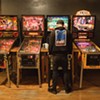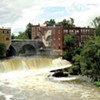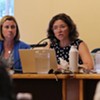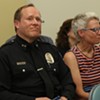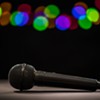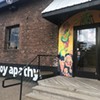Monday, November 11, 2013
Burlington / Classical music / Music Interview with ETHEL's Ralph Farris
Posted
By Ethan de Seife
on Mon, Nov 11, 2013 at 4:05 PM
While it's not exactly incorrect to refer to the music of ETHEL as classical, it would surely miss much of the point. The genre-defying, restlessly inventive string quartet brings its new program, "Grace," to UVM's Lane Series on Friday, November 15.
Cofounding member and violist Ralph Farris spoke via phone to Seven Days about the band's creative process, different kinds of grace and the enduring greatness of Rush.
SEVEN DAYS: Why is your name in all caps, anyway?
RALPH FARRIS: Why not? I don’t have a good answer! It showed up in a graphic we did once, and it stuck. The name doesn’t stand for anything, and means nothing. There’s really no good reason, which is a terrible answer for you.
So you used to be the musical director for Roger Daltrey. What does that mean, exactly?
It was a quick little run, in 1994. I was the guy who went to each city in advance of a touring concert with the Roger Daltrey Band, who were playing with orchestra, playing the music of Pete Townshend. I would train up the orchestra playing with him, but I really was the assistant conductor. The conductor would show up after me and conduct the show, and I would then be the fiddle soloist for the band. I would play “Baba O’Reilly” all summer. Really cool gig.
It was an amazing, amazing journey, and all too brief. It really turned my career trajectory in a very different way than it was supposed to be. I had just been accepted to the doctoral program at Juilliard. As a result of this, I did not do my doctorate. Shortly thereafter, I cofounded ETHEL, started working on Broadway, and took more of a turn toward the commercial side of music than I ever intended. I was probably going to be a viola professor somewhere. I’d actually still rather like to do that.
Your list of collaborators is enormous and varied — from Leonard Bernstein to Gorillaz. Can you name a few artistic partnerships that were especially fruitful, and why?
We have a program called ETHEL+, which is an outgrowth of an original program called TruckStop. It’s a model for collaboration and exploration, and it’s designed to get to know a community through its art. … We actually approach all of our work as if it is a collaboration.
Really significant people who have really colored our work:There’s an amazing Native American flutist named Robert Mirabal, of the Taos Pueblo tribe. … He brought something to us which is kind of remarkable. He considers performance — the creation of music in a concert context — to be ceremony. Bringing that to us was a real gift. It’s not something that you think about when you’re going through your schooling and playing your F-sharp minor.
Todd Rundgren — what an amazing performer this guy is. The brilliance of his work. He’s also so great with his public; a real model for how to be a great guy with your public. He says it loud and clear all the time: these are the people who are making my life what it is, and they deserve my respect and love. That’s a really awesome thing to be around. Really inspiring.
Another example is a group that is no longer together: Kaotic Drumline, based on the south side of Chicago — essentially a hip-hop drumline. They brought us energy, power, drive and honest-to-goodness feeling. Just absolutely astonishing. They’re a group of community activists who are all about giving kids opportunities to get off the streets, and they’re doing this through drums. Absolutely awesome.
There’s the amazing slack-key guitarist Jeff Peterson, who showed us in music the true meaning of “aloha.” There’s so much love in how he works. … Whenever we have Jeff Peterson around, he’s always just a glue in the room who’s going to pull disparate forces together.
I should also say that one of our founding members is the amazing Mary Rowell of Craftsbury Commons. (And my grandmother is from Enosburg Falls.) … Mary is a dynamo on the fiddle. A monster player, a force of nature. The way that she approaches her performance — just tearing into the fiddle — is something that really colored our group. We have Mary stamped all over our performance practice. ETHEL is ETHEL in many ways because of Mary. We are forever grateful to her for that.
So are people constantly banging on your door to ask if you'll work with them?
There are some door bangers, yes. … Quite often, we’ll get a call from a composer or songwriter who wants to put a project together. … There are a lot of opportunities that do show up, and that’s a wonderful thing, a great gift. We do not take that lightly. We’re deeply honored that we’ve built a place in the world so that we are visible and that people like our work enough to ask us to do things with them. Each opportunity brings new chances for us to learn something, new ways of performing. It’s very exciting, what we do: to have a shot at something new every time we enter a new project.
Does ETHEL, like, get a hard time from other string quartets because you improvise and play nice with vernacular music?
Well … the thing that [some] people could take issue with is the informality of our presentation. There’s no fourth wall. We’re laughing along with the audience if something funny happens. We also write our own music and do our own arrangements. We’re not playing Beethoven and Brahms. We do things that are bandlike. Those are the things that traditional quartets could take issue with. It’s not like people are saying, “You’re ruining the genre, thanks a lot.”
Not to pat ourselves on the back, but we’re now seeing chamber ensembles paying in clubs and less formal settings. We feel we’ve played a part in opening up new venues and new audiences to new work — to some classical work, certainly, but to new music in particular.
But this is a natural evolution of the format. Every classical institution is having to reimagine their world now to keep themselves relevant … We didn’t want to start something that we were going to have to change to make ourselves relevant. We wanted to be relevant from the beginning. We play music from now, basically. … We never planned to be revolutionary. We just wanted to make music that we loved.
The concert program for "Grace" specifically says that there’ll be no intermission. Why not?
We love to craft a through-running show. And the program is not super-long anyway — about an hour and 15 minutes. A nice time to sit and be with people. We like to finish up before people start to feel antsy. … We put careful thought into what comes next and how the thing flows. We really like to go on a journey.
How do these diverse pieces relate to one another? I understand that the conceptual link is that of grace and redemption, but could you discuss that in a little more detail? I mean, yes, Jeff Buckley's song “Grace” and the film The Mission are about redemption or salvation, but how do these concepts come through in the music, and how do you intend to communicate these ideas to your listeners?
There is no message that we’re looking to put forward to anyone. The concept of grace is a loosely binding element that is expressed in the various pieces in really different ways. There’s one piece in [the meter of] 13 by Vijay Iyer. Grace is what Vijay expresses in composing this piece that just flows so beautifully. Thirteen is a crazy-hard meter to count, but it beautifully rolls along. There’s no stress or difficulty in feeling the ease and peace and joy of just flowing along in this meter.
There’s also the grace of beauty and love in the piece [“Song for Sandra”] by our dear friend Carlo Mombelli. He wrote the piece for his wife on the occasion of their 30th anniversary. It’s a love song to his wife. There’s grace and joy and love in that. It just makes us smile.
How are the selections from The Mission the “centerpiece” of "Grace"?
That’s the piece that gets people on their feet. I’m not going to tell you why. It’s kind of astonishing. I’m shocked that it turned out the way that it did. It’s amazing music. It’s also a new thing for us to play something this decidedly romantic and heartfelt. It’s a really lyrical, gorgeous thing. … It’s our centerpiece in that it’s distinctive. When people walk away from the program, especially because it’s the last taste in your mouth, it’s something that’s gonna live with you.
What was the process of arranging this orchestral work — and others — for a string quartet? Is it more a process of subtraction? Transformation? Interpretation?
We have some secret weapons. I’m not telling you what they are. In arranging the score — it’s a transcription; there’s not really any arrangement going on — everything is there. … It gives us great joy to present something that is totally our voice and to put forth the spirit of this extraordinary score. … I still well up with tears when I’m playing.
Your promotional materials refer to the “unifying power of music.” What, exactly, does that mean to you? How do you achieve that sort of unification?
Our dear colleague and cofounder Dorothy [Lawson, cello] says something really beautiful whenever she’s asked something like this. … Whatever group is gathered in a performance space, that group, that experience is never, ever going to replicated. It could never happen again that way. To actually cherish that moment as your own moment is an amazing thing to realize and recognize. Every night is going to be different: different people, different approaches to sound, a different dinner you had before you played. Everything is its own experience.
I think we do project a spirit of specialness about being there with people. It’s part of the informality of our presentation. … There is a welcoming and an openness about feeling part of the same experience, and it’s available to any performer. … We’re slightly goofballish but also deadly serious about creating our work. There are certain sounds that you know will elicit a response. There are moments in The Mission that we know, if we do them a certain way, absolutely are going to get a certain thing. Do them another way, get another certain thing. We’re not manipulating the audience, but we do understand the effects that these things have on human emotion. We’re taking that journey with people. It’s such a gift to be able to play these concerts. We get to experience this every single time!
What are you listening to these days?
Air Supply! I’m working on an Air Supply musical for the University of Michigan, which is absolutely awesome and so much fun. It’s taking me through my own history of radio listening. So I’m listening to a lot of Air Supply.
I’m big into Roomful of Teeth, the a cappella group. Unbelievable sounds and technique and colors. Just extraordinary virtuosi. … One of their members just won a Pulitzer. I love love love them.
I’m always listening to Arvo Pärt.
Oh, my goodness, this is a crazy good record: Recomposed by Max Richter. It’s gorgeous, current, and the playing is phenomenal.
I am ever a Beatles fan and a Zeppelin fan. I love prog-rock — Marillion, Rush, both versions of Genesis. There’s no tighter band on the planer than Rush.
Brooklyn Rider, our colleagues, made a gorgeous Philip Glass record. They just play so beautifully and powerfully. The music is ridiculously awesome.
Lots of Tears for Fears. And I like Coldplay — there, I said it!
And that speaks to ETHEL’s philosophy. Music is music. If it’s good, it’s good. There’s no qualifier that we’re looking for. There’s some sort of validity in most artistic expression. … There’s something of merit, and we’re going to look for that. No judgment from us. We’re open-eared in our listening all the time.
ETHEL perform on Friday, November 15, 7:30 p.m., at the UVM Recital Hall in Burlington. Preperformance talk at 6:30 p.m. $15-25.
Comments
Comments are closed.
Since 2014, Seven Days has allowed readers to comment on all stories posted on our website. While we’ve appreciated the suggestions and insights, the time has come to shut them down — at least temporarily.
While we champion free speech, facts are a matter of life and death during the coronavirus pandemic, and right now Seven Days is prioritizing the production of responsible journalism over moderating online debates between readers.
To criticize, correct or praise our reporting, please send us a letter to the editor. Or send us a tip. We’ll check it out and report the results.
Online comments may return when we have better tech tools for managing them. Thanks for reading.
One or more images has been removed from this article. For further information, contact
[email protected].


































